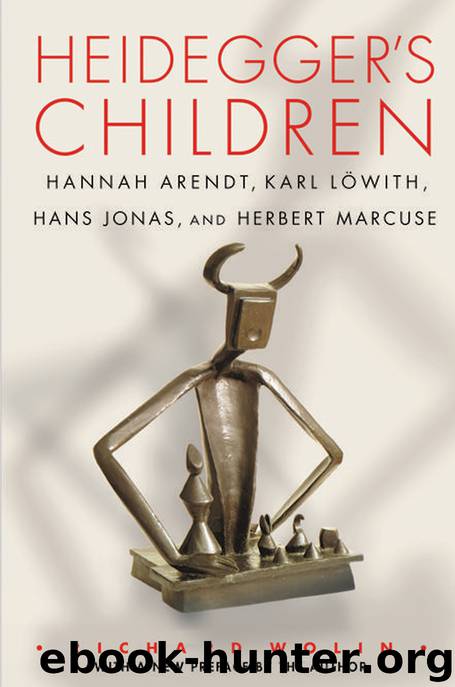Heidegger's Children by Wolin Richard Wolin Richard

Author:Wolin, Richard, Wolin, Richard
Language: eng
Format: epub
Publisher: Princeton University Press
Published: 2015-01-04T16:00:00+00:00
Perils of Political Guardianship
While the dynamism and scope of Jonas’s metaphysical vision are undeniably powerful, that vision, like all claims to knowledge, is hardly above criticism. The strategy of his philosophy of life, which insists vitalistically upon attributing “mind” and “subjectivity” to all manifestations of organic nature, down to the cellular level, entails intellectual and ethical risks. By humanizing nature and naturalizing humanity, we in effect strip humankind of its specifically human capacities. Is it meaningful to speak of the “freedom” of organic molecular life, when, as Jonas himself points out, such freedom, in the form of metabolism, is governed by an overriding necessity? In truth, organisms have no choice: they must metabolize or die. By metabolizing, they gain a measure of formal independence vis-à-vis the dead matter of inorganic nature; but does it make sense to equate such limited independence with “freedom”? By virtue of such comparisons, do we not risk remaining satisfied with a seriously truncated definition of freedom? Viewed historically, freedom connotes a hard-won achievement, a condition that is the result of struggle and courage. To suggest affinities between freedom and metabolism implies that we should rest content with a subhuman notion of freedom’s entailments.
Another risk entailed by Jonas’s insistence on life as an absolute value is that our conception of the human good is devalued. Instead of setting our sights high and aiming at a notion of the good in which individuals are encouraged to flourish—where they are allowed to realize or fulfill their capacities—Jonas’s metaphysical vitalism tends to privilege “mere life” or survival over the “good life.” If we accord normative priority to aspects of life we share in common with the rest of organic nature, those features of human life that are peculiarly human—cultural excellence, friendship, productive communal ties; in sum, all the characteristics of human life that separate us from the animal world—suffer. Thus, the price one pays for reintegrating humankind with the natural world is a diminution of human distinctiveness.
Many of the aforementioned difficulties crystallize in those aspects of Jonas’s thought that one might describe as Hobbesian. Like the author of Leviathan, Jonas’s conception of human life is predicated on a pessimistic philosophical anthropology. For both Hobbes and Jonas, the state of nature is anything but benevolent. Hobbes describes human interaction there as a bellum omnium contra omnes—a war of all against all—in which life is “violent, poor, nasty, brutish, and short.” The motivations compelling individuals to abandon this state and form a social compact are anything but noble or exalted. Instead, the primary incentive to establish society is fear—fear of a violent death. Jonas’s proximity to Hobbes (not to mention Darwin) becomes clear in his characterization of life as essentially a competitive struggle for survival. By taking nature and biology as his normative points of departure rather than, say, life in civil society, Jonas is led to anticipate the worst from humanity, rather than to expect the best.
The element of resignation implicit in Jonas’s metaphysical vision cannot help but affect his approach to ethics.
Download
This site does not store any files on its server. We only index and link to content provided by other sites. Please contact the content providers to delete copyright contents if any and email us, we'll remove relevant links or contents immediately.
| Historic | Information Systems |
| Regional |
Man-made Catastrophes and Risk Information Concealment by Dmitry Chernov & Didier Sornette(5956)
The Revenge of Geography: What the Map Tells Us About Coming Conflicts and the Battle Against Fate by Kaplan Robert D(4052)
Zero Waste Home by Bea Johnson(3805)
COSMOS by Carl Sagan(3588)
Good by S. Walden(3521)
In a Sunburned Country by Bill Bryson(3507)
The Fate of Rome: Climate, Disease, and the End of an Empire (The Princeton History of the Ancient World) by Kyle Harper(3032)
A Wilder Time by William E. Glassley(2835)
Camino Island by John Grisham(2778)
Organic Mushroom Farming and Mycoremediation by Tradd Cotter(2661)
The Ogre by Doug Scott(2657)
Human Dynamics Research in Smart and Connected Communities by Shih-Lung Shaw & Daniel Sui(2479)
Energy Myths and Realities by Vaclav Smil(2463)
The Traveler's Gift by Andy Andrews(2435)
9781803241661-PYTHON FOR ARCGIS PRO by Unknown(2343)
Inside the Middle East by Avi Melamed(2325)
Birds of New Guinea by Pratt Thane K.; Beehler Bruce M.; Anderton John C(2236)
A History of Warfare by John Keegan(2212)
And the Band Played On by Randy Shilts(2165)
